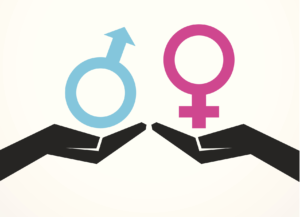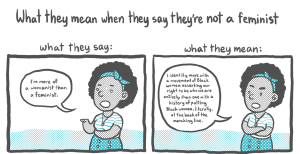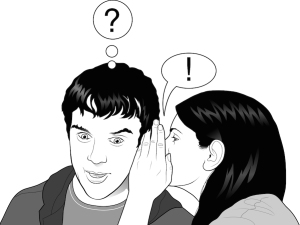Title: 5 Ways to Practice Feminist Hookup Culture
By Emma Rust
Panel 1
Image of narrator, a young woman with medium length hair and glasses.
We’re all somewhat familiar with hookup culture, whether that’s from TV, college, the night scene, Tinder, or wherever…
Panel 2
And it can be very sexually empowering partaking in hookup culture under the right circumstances.
Panel 3
Silhouette of a person with a thumbs up.
Person 1: Aw yeah more body confidence/sexual agency!
Panel 4
However, misogyny is almost always perpetuated in hookup culture, so it’s important to recognize the various ways it manifests to prevent it.
Panel 5
Image of narrator explaining.
Hookup culture should be safe for everyone who is interested. However since it often exists as an oppressive space that perpetuates gendered stereotypes, double standards, heteronormativity, and rape culture, we need to find new ways to dismantle these problematic elements.
Panel 6
So, how do we make it more feminist?
Panel 7
Images of speech bubbles with offensive labels.
Avoid labeling people based on their pro-sexual decisions.
Bubble 1: Slut
Bubble 2: Easy
Bubble 3: Whore
Panel 8
People are often shamed and judged for being “overly sexual.”
Panel 9
Image of two people gossiping about a couple making out in the background.
Person 1: She slept with 2 or 3 guys last week…
Person 2: What a slut…
Panel 10
While others are often congratulated on sexual success.
Panel 11
Image of two different people gossiping about that same couple.
Person 1: I heard he slept with 2 chicks over the weekend.
Person 2: Way to get it.
Panel 12
Image of narrator.
These labels are especially hurtful because they imply that people, often times women specifically, are immoral, desperate, easy or not worthy of respect for having casual sex.
So overall, it’s best to avoid labeling people based on their pro-hookup choices.
Panel 13
Instead, we need to respect that people should make their own decisions about their bodies and their own decisions about their bodies and their sex lives.
Panel 14
Likewise, don’t label people as prudes for not wanting to partake in hookup culture.
Panel 15
These labels are used to shame or pressure people into acting sexual when the person may not be ready or may not want to.
Panel 16
Image of a girl moving in for a kiss while the other person looks hesitant.
“I feel like I should be liberated and go for it, but…. Do I really want to?”
Panel 17
Casual sexual activity isn’t for everyone, and it should be recognized and respected as a personal choice rather than a norm.
Panel 18
Image of narrator.
And not everyone experiences sexual attraction in the same ways. For example, folks that identify as demi-sexual, may not want to partake in random or casual sex because they don’t feel attracted to people in that context. In addition, a person can have a million personal reasons for not feeling in the mood or feeling comfortable, all of which are valid.
So no matter what, it’s best to avoid shaming people for not wanting casual hookups.
Panel 19
Next Pay Attention to Power Dynamics.
Panel 20
Image of two people sitting at a bar; the guy is trying to flirt with the girl next to him.
Whether it’s buying someone a drink,
Person 1: Can I buy you a drink?
Person 2: Sure.
Panel 21
Or throwing a party in a space that you are in control of,
Panel 22
Image of a girl whispering to her friend, she looks concerned. Her friend looks ambivalent.
Person 1: I think there is someone following me.
Panel 23
Or are trying something for the first time.
Panel 24
Image of two friends at a bar, the girl in the dress is pulling the hand of her friend and pointing at another girl with short hair chuckling in the foreground. The girl in the dress is trying to convince her friend to go dance with her. The friend being pressured looks apprehensive.
Person 1: I’ve never hooked up with a girl before. I don’t know if I’m ready.
Person 2: Trust me, it will be fine.
Panel 25
These scenarios can often lead to someone feeling entitled, helpless, or pressured.
Panel 26
Image of same couple at the bar, the man throws his hands up as the girl indicates she is trying to leave.
Person 2: I have to go.
Person 1: What? But I bought you a drink, you sure you don’t want to come back with me?
Panel 27
Image of friends who were whispering. The friend being consulted looked relaxed and unconcerned while the girl still looked worried and disappointed.
Person 2: Oh relax, I know him, I’m sure he’s not that bad…
Panel 28
Image of the girls at the club. The girl in the dress pushes her friend forward towards the girl she wants her to be interested in. The friend apprehensively takes the hand of the dancing short haired girl.
Person 1: Okay, I should…
Panel 29
Power dynamics exist to support those in a position of power maintain that power. This is why we with power have to dismantle the dynamic ourselves.
Panel 30
Avoid Fetishization
Panel 31
People often times project their inner racial and gender biases on their sexual partners.
Panel 32
Sometimes compliments can have racist undertones, even if they’re well meaning.
Panel 33
Image of a white girl flirting with a Latino guy, the guy feels incredibly awkward.
I’ve always had a thing for Latino men.
Panel 34
Image of a guy flirting with a black girl, she looks irritated.
You’re pretty for a black girl.
Panel 35
Or sometimes people make damaging or insensitive assumptions that because of your gender presentation.
Panel 36
Image of a girl looking blasé.
Person 1: He’s a dude, why would he not want to hookup tonight?
Panel 37
Image of two girls on the phone, person 2 presents as more feminine while person 1 presents as more butch. She looks offended and hurt.
Person 2: I know I was with someone else, but I figured you didn’t care…
Person 1: You know being butch doesn’t mean that I don’t have feelings…
Panel 38
Image of two men talking. Person 1 looks condescending and is rejecting person 2, person two, who identifies as non-gender binary looks really hurt.
Person 1: Sorry but I’m only interested in people who are more passing.
Panel 39
Not only do you make the person uncomfortable but you end up playing into some really damaging stereotypes that fetishizes and objectifies people from certain communities.
Panel 40
Image of narrator looking understanding.
Hookups require emotional and physical vulnerability. It’s not okay to project stereotypes on people who already are in a vulnerable and possibly oppressive space.
Panel 41
Which brings me to my favorite…
Panel 42
Practice Consent!
Panel 43
Sexism really comes into play when people start objectifying women or when they feel entitled to their bodies or their time.
Panel 44
Image of three people dancing in background, person 1 is in foreground and is watching lasciviously.
Person 1: She’s dancing pretty seductively; she must want someone to dance with.
Panel 45
Image of two people in the bedroom, person 1 is standing by the door, looking apprehensive. Person 2 is sitting on the bed looking impatient.
Person 2: What do you mean you don’t want to have sex, isn’t that why you came back with me?
Panel 46
Likewise, people perpetuate sexism when they assume that men are likely to want sex and don’t ask consent or check in with their partner.
Panel 47
Image of a guy and a girl hookup up, the girl is sitting on top and has just placed the guy’s hands onto her chest without asking. He looks really uncomfortable.
Person 1: I wasn’t ready for this.
Panel 48
The best way to respect someone’s body is to allow them to make their own boundaries. This can be achieved by asking for consent and respecting one’s ‘no’. And that’s not just to sex but anything.
Panel 49
Image of narrator. Speech bubbles of what would have been better to say in the previous panels pop into the background of the panel.
We have to remember that our own sexual desires shouldn’t come before the safety and comfort of others. So we ought to respect that some people may not want to dance, kiss, go home with you, or have sex. We also need to not get offended if people change their minds.
Bubble 1: Do you want to dance? No worries if you don’t!
Bubble 2: You don’t look comfortable, you don’t have to stay if you don’t want!
Bubble 3: Can you touch my chest? Or do you want to pause?
Panel 50
Again, hooking up requires people to be vulnerable, so it’s important we allow people preserve their boundaries and feel safe.
Panel 51
So overall, the best way to practice feminist hookup culture is to be respectful of people’s choices, identities, boundaries, and understand that it’s your responsibility to make sure your partner or partners feel comfortable and into it!






















